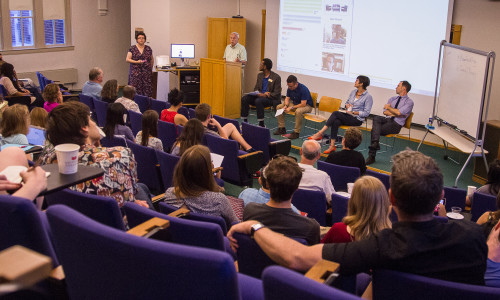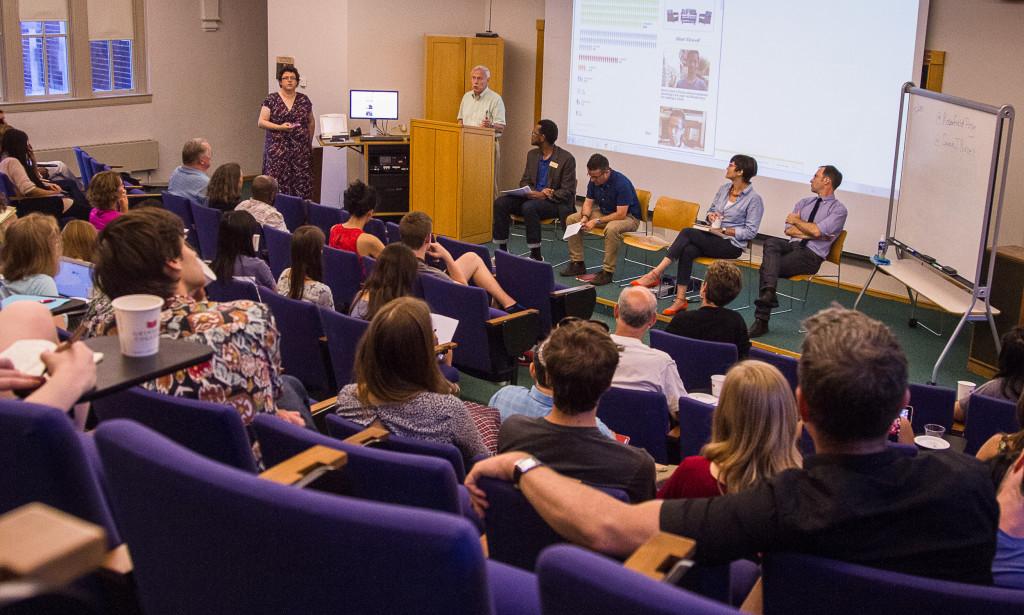
Emma Friedlander
friedlan@grinnell.edu
Last Wednesday, Sept. 16, the Rosenfield Program hosted a panel on the current refugee crisis in Europe and the Middle East. The panel was moderated by Director of the Rosenfield Program Sarah Purcell and brought together professors from several disciplines to share insight and discuss questions regarding the crisis.
The panel began with each of the panelists presenting a five-minute introductory statement which revealed their own perspective on the situation as related to their field of expertise. Professor David Cook-Martin, Sociology, started off by giving the audience a first impression of the scope of this issue. He introduced the notion that although our focus is now on the crisis’ effect on Europe, this is a far more global issue.
“It now captures our attention because it significantly affects Europe, and we care about Europe,” Cook-Martin criticized.
He went on to reveal that, in reality, the vast majority of Syrian and Iraqi refugees have fled to Lebanon, Jordan and Turkey, not European countries. He also stressed the difference between refugees and migrants, the latter being a term that politicians use to imply refugees’ lack of legal standing. He concluded by suggesting we pay careful attention to the language that politicians use.
Professor Wayne Moyer, Political Science, then focused on Europe’s response to the situation. Moyer stated that of roughly 500,000 refugees in the European Union (EU), only 40,000 have been accepted by the European Union, and the admittance of another 120,000 is currently being debated. Moyer forecasts that the number of refugees in Europe will only increase, exacerbating the problem.
“Europe is very, very ill-equipped to deal with this situation,” Moyer said. “The EU is already stressed by the divide over the crisis in Ukraine and the Greek debt crisis. National interests are taking precedent over what I would call general interests.”
Professor Gemma Sala, Political Science, picked up the conversation by looking to past examples of refugee crises in Europe, and suggested that immediate, local-level action may take precedent over long-term planning on the part of the EU. Professor Caleb Elfenbein, History and Religious Studies, also looked to the past to make sense of the current refugee crisis. He emphasized that, historically, the flow of migration from the Middle East to Europe is actually very common.
“Looking at this refugee crisis as an instance in which we can actually see the interconnection between parts of the world that we think are really separate, the Middle East and Europe, is an opportunity for students to see the interconnection of parts of the world more broadly,” Elfenbein said.
The opening statements were concluded by Professor Vance Byrd, German, who spoke to his own recent experiences in Germany. Germany is the only EU country widely accepting Middle Eastern refugees and has many grassroots organizations that are dedicated to aiding refugees. Still, Byrd acknowledged that the influx of refugees holds challenges for Germany as well. Some believe that Germany has an undue burden in the refugee crisis and that the EU should formulate a refugee distribution system so that the weight of responsibility falls equally upon all countries.
The discussion then turned to a Q&A where students and faculty asked questions ranging from the economic effects of the refugee crisis to the burgeoning of radical right wing politics as a response to the United States’ responsibility. The latter point ignited interesting debate regarding how Europe models the United States’ immigration policies and to what extent the United States is at fault for creating dysfunctional states in the Middle East. This discussion led to the consensus that although the United States should not hold the entire burden for the crisis, it is not paying its price and is conveniently separated by the Atlantic Ocean from a crisis in which it should be more involved.
“These panels force us as faculty members to get our heads outside of our areas of expertise,” Sala said. “Otherwise we’re just consumers of news, and we don’t use it to problematize [our understandings]. As scholars we have the ability to look at the implications.”
Sala also expanded on the role of Grinnell College students in attending such events.
“You come to college to become aware of the world,” Sala said. “The purpose of [college]… is to help you problematize with issues that happen everywhere else and to have those tools and resources.”































































